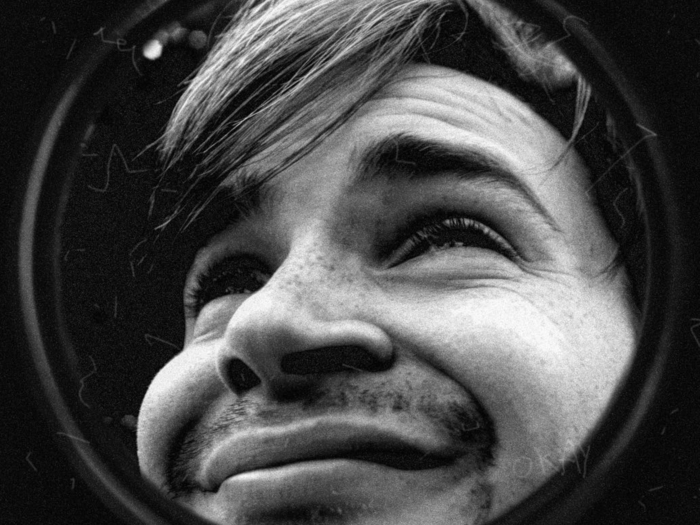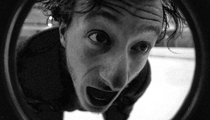• What does it mean to you to be an independent filmmaker in the USA today?
Let me start by saying A Great Lamp was made in ten days with less than $9000 by a group of seven friends who recently graduated school. It had no pre-production period. It was a thought, a whim, a need to create and be surrounded by others, and was born from these feelings rather quickly.
Now, as A Great Lamp traveled throughout the United States, and as I was introduced into different circles and pockets of filmmakers and those peripheral to filmmaking, I began to notice that the bulk of conversation regarding independent filmmaking leans heavily towards thoughts on distribution and its ever changing models, investors and new and inventive avenues toward financing projects, discussions on grants and workshops — different pillars that support certain ideas of filmmaking. I'm less interested in that, and more than a little disappointed that so much of the conversation is sucked up by these pillars, when we should really be talking about the thing itself, the thing being filmmaking, the thing being the making of movies, the thing being actually going outside and shooting an actual movie. That is the heart of independent filmmaking. And I hope the pendulum of discussion can someday soon swing back full force in that direction. If an independent filmmaker's goal is to create meaningful films and they're spending years unable to do it, they bear much more responsibility for that inability than they often seem to admit or understand. And it's always because they're more concerned with the pillars that support specific ideas of filmmaking, than they are with filmmaking itself.
Look. Filmmaking, at its best, is the sharing of dreams and the sharing of lives. Filmmakers take their thoughts and feelings, known in their truest shape only to themselves, and create these pockets of memory that they've packaged up in vessels we can all experience together. Isn't that fucking beautiful? Can you imagine how much I hate anyone who walks into that world and says "Okay, so before we as a species go outside with our iPhones and rented cameras and our friends and create these vessels, can we think about how we're gonna sell this thing? How we're gonna beg old strangers we've never met for money so we can make this thing look like a million dollars? Can we just wait a few or more years until we get all this together, and if it falls flat go back to the drawing board?" That is the state of independent filmmaking in the United States. It's an army of those people, both the filmmakers and those peripheral to filmmaking, working as hard as they can to spend all their energy in these discussions, when meanwhile there's seven friends running around Wilmington, North Carolina being happy together and filming a culmination of their most personal experiences and feelings into a vessel called A Great Lamp. I only ask aspiring filmmakers these two questions, whether you're in the United States or not — which of those two things would you rather be doing right now, and which of them are you actually doing right now?
This is what being an independent filmmaker means to me. Choosing making a movie over talking about making a movie. It's an ability specific only to true independent filmmaking. If you've moved away from true independent filmmaking and are able to secure financing for your films in a realistic timeline and consistently make the films you want to make, and that's what you enjoy, more power to you! But that's not most of us. Don't wait if waiting is the only game you've been playing.
• Has your experience of this changed in the past few years? If so, how?
I graduated school only a few years ago, and made my first feature even more recently than that, so I speak from this vantage point. With the success of A Great Lamp came an influx of new filmmakers surrounding me and my friends. And so there have been many people who've filtered through my "squad" as I've discussed new projects, all of them interested in changing my views on what filmmaking is and should be as these new projects evolved and tried to take shape. For a while, I was starting to believe them. "Maybe I'm wrong? Maybe I should think harder about the pillars I thus far haven't given much thought to?" What ended up happening, which completely fits with my description of independent filmmaking, is none of those projects got made. Too much talking, too much doubt, not enough getting on with it. In the end, I've separated from those new additions to my squad. If anything, I'm even more sure now than I was before that my initial thoughts were and are right. And those filmmakers who filtered through my squad are wrong. Or at least, I'm right in what I enjoy. Perhaps they enjoy spending the next few years of their lives begging others to let them do something they already know how to do?
• Has the emergence of new distribution models (namely online streaming platforms) changed your relationship to your work and/or to your audience?
I'll admit that I absolutely love seeing movies on the big screen, and I love showing movies on the big screen. It's fun, it's exciting, and people gathering together in a shared experience of embarking on someone else's dream and life vessel is such a unique experience.
That being said, the internet is a huge win when it comes to filmmaking, and media in general. And I'm not only talking about the usual suspects like Netflix, Hulu, Amazon. I'm talking Youtube, Vimeo, the ability to self-host. There's so many avenues to put your work up and show others. Will you always become the next world phenomenon with an audience of millions, without the marketing push of those subscription platforms? No, of course not. But years ago, what were the options for independent filmmakers that didn't mean reaching out to a distributor, or starting your own road show (which as fun and awesome as that can be, must at some point come to an end)? The ability to just take a movie you made yourself, then put it up yourself, and then tell other people about it by yourself, is wonderful.
In some ways, I'm sad when I see my colleagues succeed in making their first independent feature, then soon after get distribution. Often those films end up on iTunes, Amazon Prime, some other service. And guess what? No one watches it. Why would they? How many people out there are willing to pay five dollars to watch a movie they've never heard of? And now those colleagues of mine can't as easily show their films to anyone they meet who is vaguely interested, because they have to ask for money. It's much easier to say "Hey, check out this free thing," than it is to say "Pay five dollars to maybe watch this." Unfortunately, they trap themselves into this scenario by focusing on the pillars of filmmaking, drawing upon investors to make their films. Now they're forced to attempt a return on investment. Which won't happen anyway. But now they're in that black hole of having to try.
But then there's platforms like Youtube, Vimeo and the like. I spend hours browsing the internet, looking at different artists and their beautiful paintings and illustrations on Instagram, listening on Youtube as people upload their personal music compositions, their covers of popular music, vaporwave that so many of us collectively drift off to late in the night. What about a world where we all also roam through the web and watch independent feature after independent feature? Exploring vessel after vessel of packaged memories that other people have created and uploaded for free on the internet for us all to experience together?
I'd dig it.


